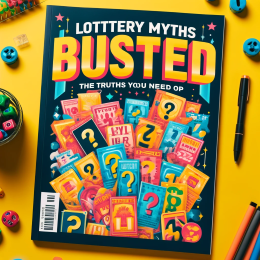
Hey everyone, Lottery Strategies here! And today, I want to talk about something a little different—lottery myths. There are a ton of misconceptions out there that might be influencing how you play, and maybe even how you think about your chances of winning. Let’s dive into some of these myths and uncover the real facts, so the next time you buy a ticket, you're fully informed.
Myth 1: "Your Chances of Winning Increase if You Play Regularly"
The Consistency Confusion
A common belief is that if you play the lottery regularly, your chances of winning increase. However, the truth is, each lottery draw is an independent event. This means the odds of winning remain the same, regardless of how often you play. Think of it like flipping a coin; no matter how many times you flip it, the chances of getting heads or tails are always 50/50.
Expert Insights
Statistics experts consistently emphasize that the probability of winning the lottery does not change from draw to draw. The odds are preset, and playing more often doesn't change these odds—it just means you're spending more money.
Myth 2: "Certain Numbers Are Luckier Than Others"
The Numbers Game
Some players swear by their lucky numbers, whether it’s a birthday, anniversary, or a number they just feel good about. But in reality, in the realm of random number draws like the lottery, all numbers have an equal chance of being picked. No number is luckier than another.
Real-Life Example
Consider the story of Richard Lustig, a man who won seven lottery grand prizes. He claims to play the same numbers repeatedly, which might seem like proof that certain numbers are luckier. However, statisticians point out that his wins are more about volume and persistence rather than any particular magic in his numbers.
Myth 3: "Playing on a Specific Day Boosts Your Chances of Winning"
Timing Doesn't Matter
It might seem tempting to think that playing on a less popular day could increase your chances of winning due to fewer people playing. However, the lottery doesn’t work like a raffle where the number of participants influences the odds. Your chances remain the same, irrespective of how many others are in the game.
Myth 4: "Lotteries Are Only for the Uninformed or Poor"
Who Really Plays the Lottery?
The stereotype that only the desperate and uninformed play the lottery is far from true. A wide variety of people, from all walks of life, play the lottery. Funds from lottery tickets often contribute to public sectors like education, parks, and funds for veterans and seniors. It’s not just a game—it’s a contribution to society.
Economic Contributions
In many states, lottery revenues help fund important community services. For example, in Georgia, lottery funds support educational programs, including the HOPE Scholarship, which has helped millions of students attend college.
Myth 5: "More Expensive Tickets Increase Your Chances of Winning"
The Cost Factor
While it’s true that more expensive tickets can sometimes offer better odds or higher prize amounts, they don’t inherently increase your chance of winning the jackpot. Each game has its own odds, and higher prices reflect potential returns, not probabilities.
Comparison Breakdown
For instance, while a $1 scratch-off might offer odds of 1 in 4.5 of winning something, a $20 ticket might have odds of 1 in 2.5. It's important to read the fine print and understand what each ticket offers, which is often just higher-value prizes, not better chances of winning the jackpot.
The Psychological Impact of Lottery Myths
The Allure of 'What If'
The thrill of potentially winning big can lead people to irrational beliefs and behaviors. It’s crucial to approach lottery games with a clear understanding of the odds and see them as a form of entertainment rather than a viable investment.
Risks of Misbelief
Believing in myths can lead to problematic gambling if people assume they have a higher chance of winning than they actually do. Always play responsibly and within your means.
How to Play Smart
Set a Budget
Decide how much you can afford to lose before you even buy a ticket. Stick to this budget strictly.
Realistic Expectations
Remember, the lottery is a game of chance with very slim odds of winning. It's meant to be fun, not a way to make money.
Signing off
Understanding the facts about the lottery can help prevent you from falling into traps set by common myths. It’s okay to dream about what you'd do if you won big, but it’s also important to stay grounded in reality. Play for fun, and remember, every ticket is a contribution to your state